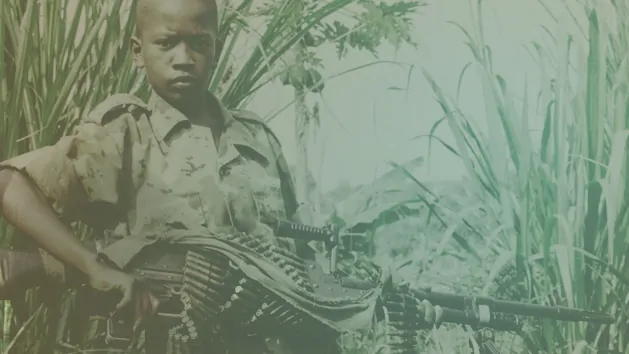
On the heels of a national statement to bolster efforts to fight human trafficking, U.S. President Barack Obama announced waivers under the Child Soldiers Prevention Act for several countries that the U.S. has identified as some of the worst offenders in the recruitment of child soldiers. This is the third consecutive year the President has announced such waivers creating an outcry among groups working to protect children.
On Friday, Sept. 28, the President released a memorandum stating it would be “in the national interest” for Libya, Yemen and South Sudan to be fully exempted from sanctions that would prevent these countries from receiving weaponry and military training from the U.S. under the Child Soldiers Prevention Act, and grant a partial waiver for the Democratic Republic of Congo (DRC).
The U.S. law prohibits U.S. military education and training, foreign military financing and other defense-related assistance to countries that recruit soldiers under the age of 18, and countries are identified as offenders if they are listed on the State Department’s annual Trafficking in Persons report.
Yet the announcement of waivers came just days after the President delivered a speech at the Clinton Global Initiative in New York City expressing his outrage over human trafficking, and the administration’s renewed commitment to fighting this injustice. He said, “When a little boy is kidnapped, turned into a child soldier and forced to kill or be killed—that’s slavery.”
Over the past decade, more than 2 million children have been killed in conflict situations, and about 6 million children have been seriously injured or permanently disabled, according to UNICEF.
And now, some in the NGO community and government are saying the President’s actions are speaking louder than his words in the international effort to protect children.
But this isn’t the first time this has happened. The waivers were announced in 2010 with no prior consultation with Congress or the NGO community.
The justifications for the waivers vary from year to year and from country to country, but usually focus on reasons of national security. Libya is a new addition to the waivers this year, while Chad was removed from the waiver list. Burma, Somalia and Sudan are prohibited from receiving foreign military financing and international military training assistance under the law.
Congressman Jeff Fortenberry, author of the Child Soldiers Prevention Act, released a statement in response to the waivers saying the intent of the law must be protected. “The unthinkable practice of the use of children as soldiers continues in the world today,” said the Vice-Chairman of the House Foreign Affairs Subcommittee on Africa, Global Health and Human Rights. “The United States must not be complicit in this practice. The announcement of waivers for countries should only be for carefully discerned prudential reasons to help force countries away from this pernicious practice. The intent of the law is clear—the waiver authority should be used as a mechanism for reform, not as a way of continuing the status quo.”
Some government officials and NGO organizers do agree, however, that enforcing these sanctions against some countries could severely hamper counterterrorism efforts or even enable the use child soldiers.
“I disagree with the characterization of the waiver as the Obama administration ‘turning its back’ on the issue of child soldiers,” says Chris Jenks, director of the Criminal Justice Clinic and assistant professor of law at Southern Methodist University’s Dedman School of Law. Jenks’ most recent position was as U.S. Army Chief of the International Law Branch of the Office of the Judge Advocate General in the Pentagon, and he was also the lead prosecutor in the army’s first counterterrorism case.
Jenks says although the waiver allows the U.S. to continue to train and equip the militaries in Libya, South Sudan and Yemen, this is actually beneficial, since it builds “their competence and legitimacy.” He adds, “And it’s certainly in the interest [of the U.S.] that Yemen be better able to counter al-Qaeda’s increasing presence. And not issuing the waiver, turning off that military assistance, is neither a human rights victory nor particularly helpful to child soldiers.”
While it’s easier to see counterterrorism and security links to Libya and Yemen, it’s not so easy in South Sudan.
Last year, south Sudan had been exempted based on the fact that it had seceded from the north to become the world’s newest country just days before the worst offenders in the use of child soldiers were announced. As relations have been increasingly unstable in both Sudan and South Sudan with “southerners” living in the north essentially being exiled, it’s no surprise that the U.S. wants to continue to assist South Sudan.
North Sudan’s president Omar al-Bashir oversaw one of the longest-running and deadliest wars of the 20th century and was accused of genocide in the Darfur region where upwards of 400,000 were killed—although the International Criminal Court said there was insufficient evidence for a genocide conviction.
Jenks says cutting off military assistance to South Sudan will only make them more vulnerable to (north) Sudan, “And perversely, might actually lead to them using more child soldiers.” He says this could escalate conflict and lead to more atrocities in the South. “So I don’t think the administration views the waiver for South Sudan as a good idea, just a less bad idea than the alternative,” he says.
Jenks himself spent time involved in military training in the DRC, and says he has seen the benefits firsthand. “I think it’s notable that the U.S. issued only a partial waiver for the DRC allowing the U.S. military to continue to work with the Congolese on professionalization of their military and eliminating the issue of child soldiers, but withholding equipment for a second Congolese Infantry Battalion unless and until the DRC does more to counter the problem of child soldiers—specifically participating in the UN’s joint action plan.”
The idea that there are no constraints on these waivers is what troubles Harvard-educated University of Miami School of Law professor Stephen Schnably. “I grapple with the fact there is no criteria for the waivers and under the section that allows the President to issue a waiver for national security reasons. There are no time limits,” he says. “In a way, we are saying that national security trumps preventing the use of child soldiers. But the bottom line is that all U.S. presidents—Democratic and Republican—use waivers, and this never would have been passed in the first place without them. What they’re telling us though is that they’d like to stop child soldiers, but there’s something more important.”
The waivers mean this Act has little in the way of actual teeth, says Melanie Tomsons, executive director and chief communications officer of Never Again International, which mobilizes young people for international peace efforts. “The Act has had an impact in the sense that it is on the books, and it makes a moral statement that the United States government opposes the use of child soldiers,” she says. “But in my view, it is a muted message because the almost routine use of waivers empties the bill of any effect. The Act has a very wide loophole. The Act does not automatically limit aid funding to gross violators and grants seemingly unlimited discretion to the President to sidestep the bill.”
“Eliminating the recruitment and use of child soldiers is a tremendously important goal shared by the complete Western political spectrum,” says Jenks. “ But while the problems and the resulting harms which flow from child soldiers are clear cut, the solutions are surprisingly nuanced, complex and time consuming.”
Shannon Sutherland Smith is a writer, editor and columnist based in Alberta, Canada. She works for several metropolitan daily newspapers as well as magazines and NGOs with a special focus on social justice issues. Shannon is also a mother of five working to raise the next generation of anti-apathetic Christ followers.





















